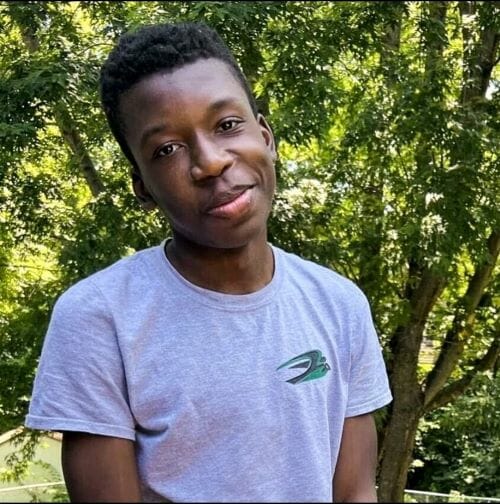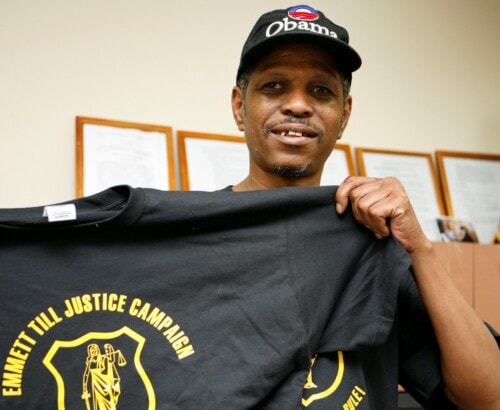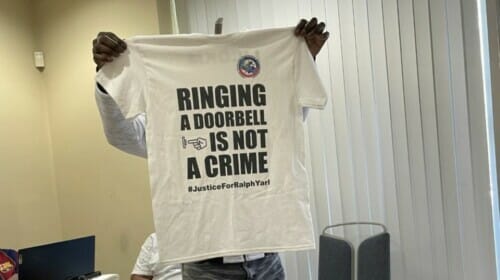Past and Present Meet for KC Scholars Through ‘Till’ Movie New Scholarship Created in the Name of Ralph Yarl
Published August 2nd, 2023 at 6:00 AM
Above image credit: The t-shirt that the Liberian bi-state organization is producing for the Ralph Yarl family. (Mary Sanchez | Flatland)Lessons from one of America’s best-known stories depicting racial hatred became the backdrop for KC Scholars to announce a $50,000 scholarship in the name of Ralph Yarl.
Ralph is the Black teenager of Liberian descent who was shot in April after he approached a house in Kansas City’s Northland. He was trying to pick up his younger brothers to take them home from visiting friends.
Ralph had the correct house number but went to an address on Street instead of Terrace.
The new scholarship was announced Saturday after a private screening of the movie “Till,” which had been previewed earlier in the day by a group of KC Scholars.
“Till” documents the story of Emmett Till, who at 14 was brutally murdered in 1955 when he went to visit his cousins in Mississippi. The movie, released last year, retells the story largely from the perspective of Emmett’s mother, the late Mamie Till-Mobley.
Remembering Emmett Till
Historic Parallels
Welcoming Ralph’s mother to the stage at the Gem Theater, KC Scholars’ Chief Operating Officer Natalie Lewis announced the new award, which will go to an area high school junior.
“For her to be standing here, right now, she is that woman on that screen,” Lewis said of Ralph’s mother.
For many present, recent events evoke strikingly similar themes: Young Black boys being viewed as threatening, as far older than they are in age and other prejudiced assumptions.
Two men later confessed to Emmett’s killing, after they had been quickly acquitted by an all-white jury.
Cleo Nagbe, Ralph’s mother, joined Lewis on the stage and thanked those present for their support, acknowledging the stress of the ongoing case.
Ralph was shot twice, once in the head and again in the arm after he fell on the stoop. He continues to recover and attended the movie screening.
“God decided to begin the story with saving Ralph’s life, and we are grateful for that.,” Nagbe said. “But we don’t know how the story ends.”

Nagbe expressed exasperation with how the case has unfolded, citing “delays and mistrust and lies.”
The homeowner who answered the door, allegedly with a revolver in hand, Andrew D. Lester, 84, pleaded not guilty in the case. He’s been charged with two felonies.
The specific scholarship in Ralph’s name complements the work of the KC Scholars organization.
The program awards juniors up to $50,000 during a five-year period to earn a two- or four-year degree.
KC Scholars’ goal is to aid low- and moderate-income adults with gaining a college education and other credentialled training.
The initiative also provides college savings matches for 9th graders, scholarships for 11th graders and help for older learners. It works with area employers to match people with apprenticeships, internships and jobs.
A motto of the program is, “A good-paying job and education should be available to everyone.”
Equitable Justice
Lewis told the audience that in a brief conversation, Ralph’s main questions dealt with ensuring that awarding the scholarship would be a fair process.
In her remarks, Lewis challenged the audience to work toward addressing bias and for an equitable justice system.
The message echoed an earlier discussion when KC Scholars watched the “Till” film and then listened to and asked questions of a panel.
Participating were Alana Mayo, president of Orion Studies, Preston Holmes, a director of the Till movie and Tricia Rojo Bushnell, executive director of the Midwest Innocence Project.
The panel discussion was moderated by Dia Wall, an anchor and reporter at KSHB 41.
Bushnell said that she stressed to the students Kansas City’s connection to the Till case.
The late civil rights activist Alvin Sykes worked for years to convince the FBI to reopen the case. Eventually, he succeeded.
Emmett’s body had to be exhumed because during the original proceedings they hadn’t officially confirmed that it was his. This was substantiated before he was reburied.
Attorneys for the men accused in 1955 claimed that the NAACP had planted the body in the river where it was found. The allegation was depicted in the movie.
Sykes, who died in 2021, also was instrumental in the passage of the Emmett Till Unsolved Civil Rights Act, which created a cold case unit within the Department of Justice to address older cases.
The Kansas City, Kansas, native also worked to pass federal anti-lynching legislation. President Joe Biden signed the Emmett Till Antilynching Act into law in 2022, designating lynching as a hate crime.
Students React
A sampling from the student’s earlier comments during the panel discussion was played for the audience at the Gem.
“He was just 14, a year older than me,” said one student of Emmett.
Another student told the panel: “I want to be proud to say that I’m American, to fly that flag high. But when I see movies like these I hesitate.”
Both were encouraged to study, to learn about historic cases like that of Emmett Till and to advocate for fairness in our justice systems.
Bushnell replied to a question about what students who were moved by the film could do to react. She said the Midwest Innocence Project prods people to ask questions.
“Who decides justice where you live?” she said.
She encouraged the students to reflect on the people in Emmett’s story who had power within the justice system during his era.
“Who has that power right now and how do we ask them to do something?” she said.
The panel also discussed centering the film on Emmett’s mother.
Holmes explained that care was taken not to vividly depict the violence that was suffered by Emmett, yet to capture the aftermath, which included momentum to pass major civil rights laws.
It was also important to showcase the support his mother had from her community, the Black joy of herself and her friends.
The film was intended to be, he said, “a mother-son love story.”
Mary Sanchez is senior reporter for Kansas City PBS/Flatland.




